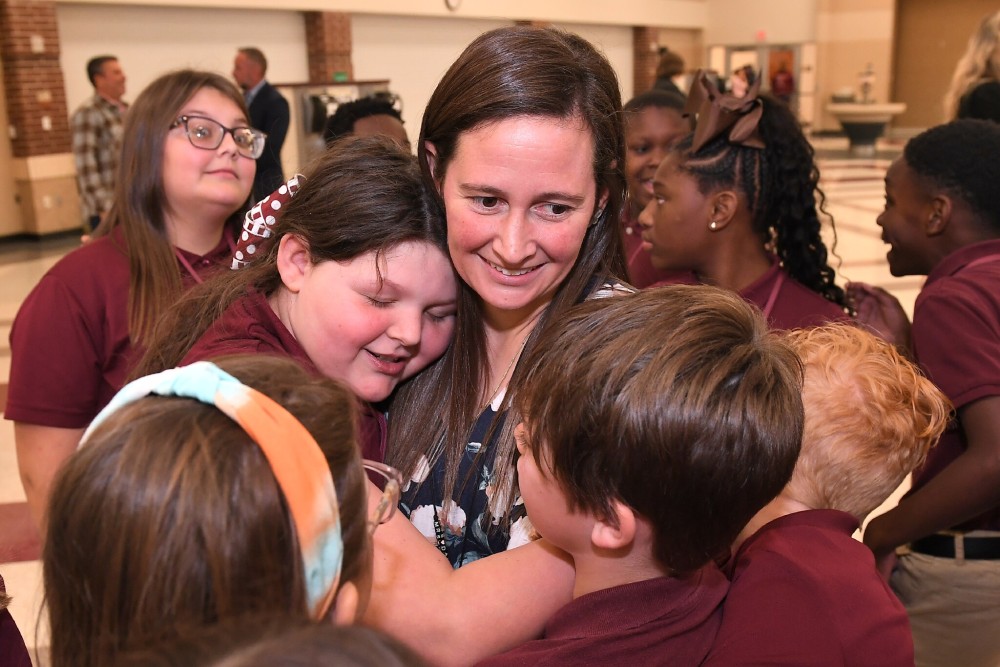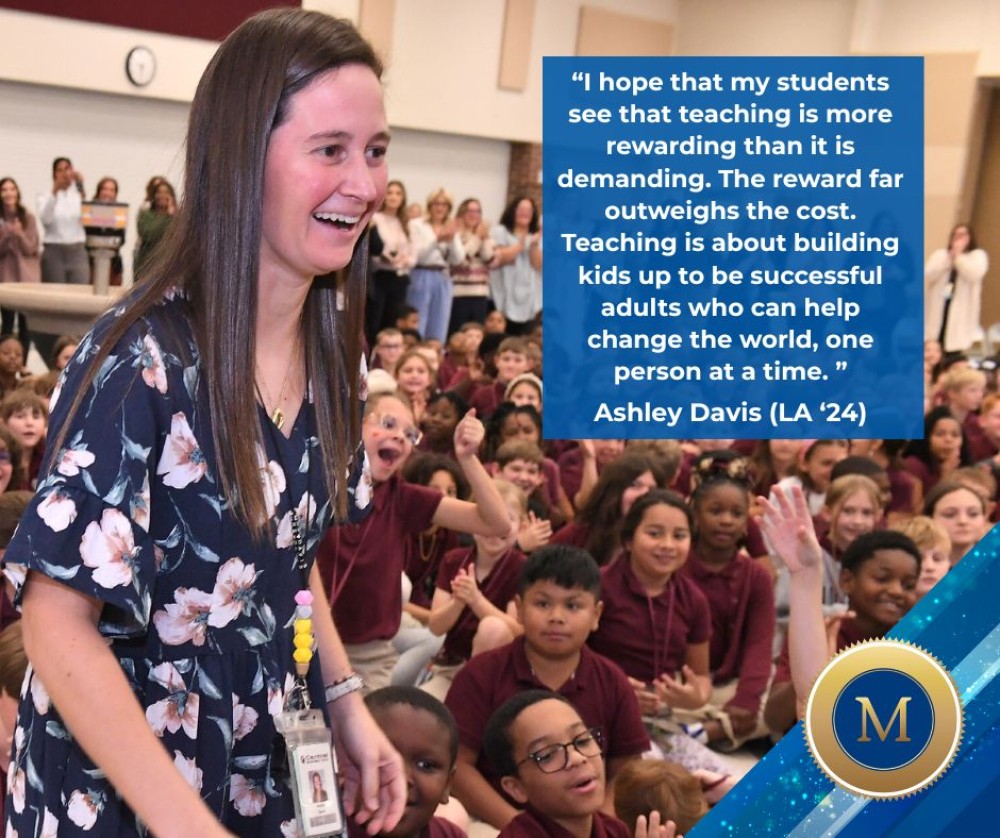Spotlight: Ashley Davis (LA '24)
June 16, 2025
Louisiana Milken Educator Ashley Davis (LA ‘24) is a fourth grade math teacher at Central Intermediate School in Central, Louisiana. Davis empowers her students by creating a classroom where general and special education students learn together, fostering collaboration, confidence and social-emotional growth. Davis received a 2024-25 Louisiana Milken Educator Award on December 4, 2024, making her the 3,000th Milken Educator Award recipient.
Milken Family Foundation: How did it feel to be the 3,000th Milken Educator Award recipient and what was the day of your Award notification like for you?
I felt a little extra honored to be the 3,000th Milken Educator. I don’t know if it was by design or just luck of the draw, but I know that it was exciting for my entire little district. I feel proud to have been able to represent us in this way.
That day was a wild ride, I had actually been dressed as Santa the entire day before and started feeling bad that night. The next morning I messaged my principal and told her that I was not feeling the best but was coming to school. She had me convinced it was just all my dancing as Santa! Ha, ha. The entire school thought we were going to be celebrating student success. I started to wonder if something else was up because I noticed there were people from other schools present. I had never heard of the Milken Educator Award, so when Mr. Milken started talking I was still just as oblivious as ever. When he said my name and the cameras appeared out of nowhere, everything started moving in slow motion. My two teaching partners grabbed me out of excitement, one stood me up. All I could think about was, where is my kid and Brad?! Kylee was in the front row and Brad was at home sleeping! Ha, ha. The interviews were a wild thing for me and we were carried off to lunch and then dinner. The entire day was CRAZY, but it is a day that I will never forget. It was a great day for me, my family, my students, my school, my district and my town.

MFF: Your students clearly see you as a role model, even dressing up as you for Halloween! How do you think your approach may inspire students to see themselves as future educators?
I hope that my students see that teaching is more rewarding than it is demanding. The reward far outweighs the cost. Teaching is about building kids up to be successful adults who can help change the world, one person at a time.
MFF: How has your own struggle with learning math shaped the way you support students who find math challenging, both academically and emotionally?
The struggle was real. I just didn’t get it. But I was being taught the “old” ways of math. I think that students (and parents) who buy into this “new” math are going to be so much better off. When I learned math, it was just the process, never the why. And when my little ADHD brain couldn’t remember the process, I had nothing to fall back on to help me remember, because there was no “why” behind the process. Today, we give kids common number sense strategies to help them figure out problems. We teach them to be problem-solvers instead of process-solvers.
MFF: Your inclusion classroom is recognized at the school, district, and even state level. What are the key elements that make your co-teaching model so effective, and how do you foster collaboration between general and special education?
My special education teacher is like my other half. We worked like a well-oiled machine that never really needed an oil change. We loved each other and worked through any type of misunderstanding. We often would co-teach, then break into microgroups where we could each meet the needs of each student we had. We were always willing to try new things and figure out what worked for each class. We definitely were blessed because we worked so well together. We had the benefit of knowing each other beforehand and working together in other settings. I really can’t explain it. We just existed together and it was beautiful. When we planned together, it flowed because we were always on the same wavelength.
MFF: How did students respond to your Milken Award?
They were STOKED. Most of them really wanted to know what I would buy from Walmart. Some were panicked because they thought I was moving to California, but we cleared that up really quickly. HA, HA. They felt as though they had won, that’s exactly how I would have wanted them to feel. When one of us wins, we all win.
MFF: How did you end up in education?
It just made sense for me. I don’t have anything deep for this one. It’s just what the Lord has called me to do. Through my coaching at an early age, someone told me that I had the gift of teaching, I felt peace about that and ran with it.
MFF: How do you define “success” for yourself, and for your students?
Success comes in many different forms and looks different for everyone. I think of success as something that reflects you leaving it all on the field knowing I did everything I could, even if I didn’t win it all. Recently my 8U softball team has been playing terribly. We went back to the fundamentals, they worked their little tails off at practice and played lights out in our last tournament. They lost in the semifinals, but it was a success. We all left the ballpark feeling like we grew. It’s the same mindset in the classroom, if we grow, we are successful. Success should be measured by growth, not trophies and awards.
MFF: Who are your role models in education?
Mostly my role models are my coaches who loved me and guided me for who I was. They never tried to change me.They just met me where I was and helped build me into the person I am today. Most of these coaches were also classroom teachers I had.
MFF: What do you hope students remember from their time with you?
I hope my students remember that I loved them as my own. Every day is a new day. If yesterday was terrible, today doesn’t have to be. Giving grace goes a very long way. I hope they remember to give grace even when it’s not deserved.
Don’t miss any new articles and updates from Milken Educator Awards:


